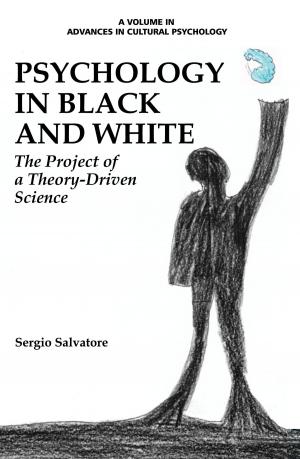Cultural Psychology of Musical Experience
Nonfiction, Health & Well Being, Psychology, Child & Adolescent, Adolescent Psychology, Social Psychology| Author: | ISBN: | 9781681234861 | |
| Publisher: | Information Age Publishing | Publication: | May 1, 2016 |
| Imprint: | Information Age Publishing | Language: | English |
| Author: | |
| ISBN: | 9781681234861 |
| Publisher: | Information Age Publishing |
| Publication: | May 1, 2016 |
| Imprint: | Information Age Publishing |
| Language: | English |
This book forms a basis and a starting point for a closer dialogue between musicologists, anthropologists and psychologists to achieve a better understanding of the cultural psychology of musical experience. This is done by arranging a meeting point or an arena in which different aspects of psychology and musicology touch and encounters each other due to how the two fields might be defined today. In line with this the book consists of a group of scholars that have their feet solidly grounded in psychology, social science or musicology, but at the same time have a certain interest in uniting them. On this basis it is divided into five parts, which investigates musical sensations, musical experiences, musical transformations, musical fundamentals and the notion of a cultural psychology of music. Thus another aim of this book is to prepare the basis for a further growth of a cultural psychology that is able to include the experiences of music as a basis for understanding the ordinary human life. Thus this book should be of interest for those who want to investigate the mysterious intersection between music and psychology. ENDORSEMENTS "Near a century ago, Alfred North Whitehead, a philosopher sensitive to the natural vitality of human intelligence, warned against the restriction of awareness by ‘products of logical discernment’. This book makes a bold and much needed effort to recover an appreciation of the creative agency in music of all kinds, which supports mastery of all domains of cultural intelligence, including language, and ‘artificial intelligence’. We need to replace a rational psychology of musical form with appreciation of impulses of ‘musicality’ in the life of every human society. From birth, and before, a human mind is eager to share the rhythms and tones of awarenesswithfeeling in body movement, elaborated in song, instrumental performance or dance. The scholastic disciplines of psychology, anthropology, musicology and ethnomusicology, separated by artificial conventions, need to recover this common ground by 'a project that aims at assembling disciplines that have been separated and developed individually for almost hundred years ... to achieve a better understanding of the cultural psychology of musical experience.' This collection of papers boldly meets this challenge, with skillful respect for the complicated history of our understanding." Colwyn Trevarthen Professor (Emeritus) of Child Psychology and Psychobiology, School of Philosophy, Psychology and Language Sciences, The University of Edinburgh "This book is an important marker in the next wave of interdisciplinary sociomusical study. Culture, individual experience, and social forces converge here and are addressed, and sometimes redressed, through musical means. Bravo!" Tia DeNora Professor, Sociology, Philosophy & Anthropology (SPA) Exeter University EX4 4RJ, UK "Klempe has crafted a fascinating collection of discussions that is accessible and inspiring. Both students and experts will find this book invaluable." Fathali Moghaddam, Professor of Psychology Director of the Interdisciplinary Program in Cognitive Science, Georgetown University
This book forms a basis and a starting point for a closer dialogue between musicologists, anthropologists and psychologists to achieve a better understanding of the cultural psychology of musical experience. This is done by arranging a meeting point or an arena in which different aspects of psychology and musicology touch and encounters each other due to how the two fields might be defined today. In line with this the book consists of a group of scholars that have their feet solidly grounded in psychology, social science or musicology, but at the same time have a certain interest in uniting them. On this basis it is divided into five parts, which investigates musical sensations, musical experiences, musical transformations, musical fundamentals and the notion of a cultural psychology of music. Thus another aim of this book is to prepare the basis for a further growth of a cultural psychology that is able to include the experiences of music as a basis for understanding the ordinary human life. Thus this book should be of interest for those who want to investigate the mysterious intersection between music and psychology. ENDORSEMENTS "Near a century ago, Alfred North Whitehead, a philosopher sensitive to the natural vitality of human intelligence, warned against the restriction of awareness by ‘products of logical discernment’. This book makes a bold and much needed effort to recover an appreciation of the creative agency in music of all kinds, which supports mastery of all domains of cultural intelligence, including language, and ‘artificial intelligence’. We need to replace a rational psychology of musical form with appreciation of impulses of ‘musicality’ in the life of every human society. From birth, and before, a human mind is eager to share the rhythms and tones of awarenesswithfeeling in body movement, elaborated in song, instrumental performance or dance. The scholastic disciplines of psychology, anthropology, musicology and ethnomusicology, separated by artificial conventions, need to recover this common ground by 'a project that aims at assembling disciplines that have been separated and developed individually for almost hundred years ... to achieve a better understanding of the cultural psychology of musical experience.' This collection of papers boldly meets this challenge, with skillful respect for the complicated history of our understanding." Colwyn Trevarthen Professor (Emeritus) of Child Psychology and Psychobiology, School of Philosophy, Psychology and Language Sciences, The University of Edinburgh "This book is an important marker in the next wave of interdisciplinary sociomusical study. Culture, individual experience, and social forces converge here and are addressed, and sometimes redressed, through musical means. Bravo!" Tia DeNora Professor, Sociology, Philosophy & Anthropology (SPA) Exeter University EX4 4RJ, UK "Klempe has crafted a fascinating collection of discussions that is accessible and inspiring. Both students and experts will find this book invaluable." Fathali Moghaddam, Professor of Psychology Director of the Interdisciplinary Program in Cognitive Science, Georgetown University















